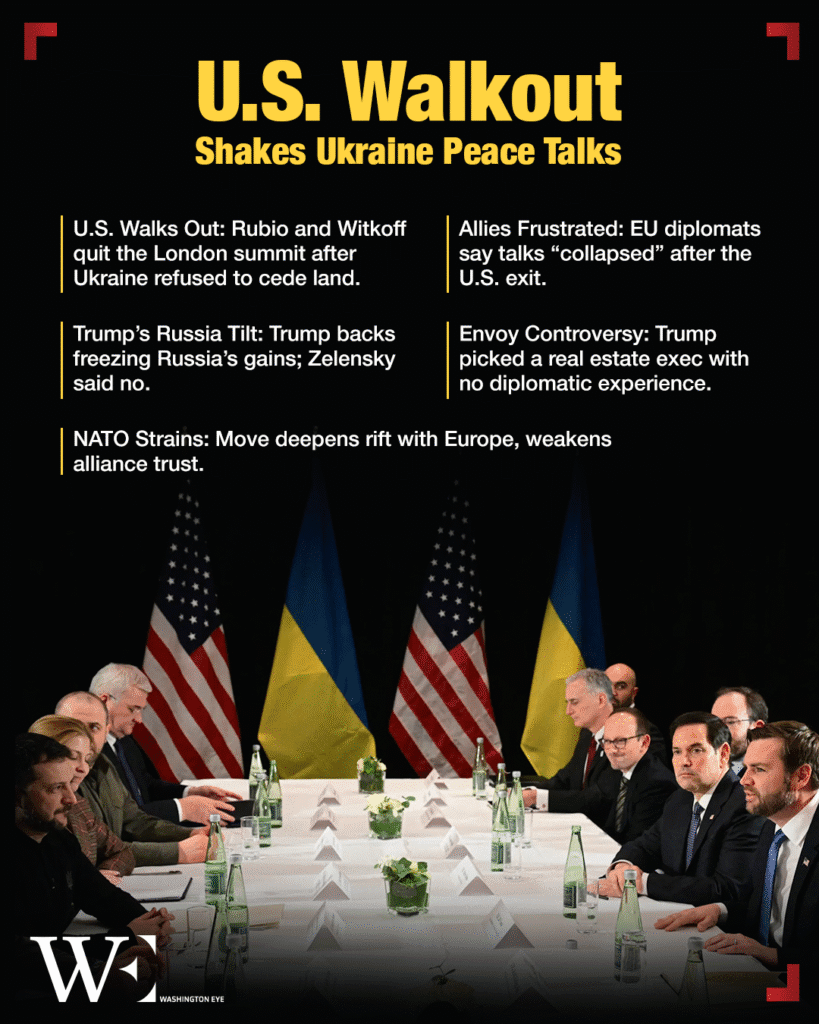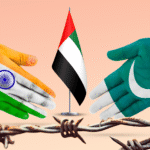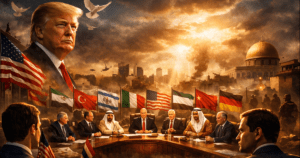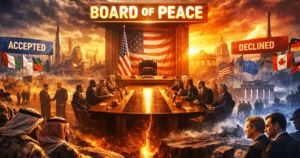The sudden exit of top U.S. officials from the London-hosted Russia-Ukraine ceasefire summit on April 23, 2025, has sent shockwaves through global diplomatic circles. Once seen as a critical opportunity to forge a multilateral framework for peace, the talks are now marred by political discord — with the United States increasingly perceived as a destabilizing force rather than a stabilizer. Compounding the uncertainty, President Donald Trump and Ukrainian President Volodymyr Zelensky met briefly over the weekend at the funeral of the Pope. Although the encounter was short and largely informal, it offered a rare — and perhaps fleeting — chance for a reset amid deteriorating U.S.-Ukraine relations.
The question now facing global leaders: will this unexpected meeting between Trump and Zelensky alter the grim trajectory of the war, or was it simply a symbolic gesture against the backdrop of mounting diplomatic fractures?
The London Talks: Derailing Diplomacy
The London peace initiative was organized to forge tangible progress in a war that has dragged on for more than three years with staggering human and economic costs. The talks, backed by Ukraine’s Western allies — the U.S., U.K., France, and Germany — aimed to present a coordinated diplomatic front.
Yet at the last moment, U.S. Secretary of State Marco Rubio and special envoy Steve Witkoff withdrew from the summit, reportedly in response to Ukraine’s refusal to consider formal territorial concessions to Russia. Their exit dramatically weakened the credibility of the negotiations.
European diplomats reacted with visible frustration. Without the presence of the United States, the talks lost their momentum, and hopes for a cohesive peace framework faded rapidly. What remained was a stark illustration of the growing divide between Washington and its European partners.
Trump’s Russia Strategy
President Trump’s foreign policy has long deviated from traditional alliance structures in favor of personal relationships and transactional diplomacy. His administration’s decision to pull out of the London summit fits this pattern, privileging direct engagement with Russia over multilateral solidarity.
Trump’s aides had floated a ceasefire proposal that would permit Russia to retain control over large swaths of occupied Ukrainian territory in exchange for halting active hostilities. President Zelensky firmly rejected the proposal, reiterating that Ukraine’s sovereignty and territorial integrity were non-negotiable.
Underlying Trump’s approach is a broader ideological shift: skepticism toward collective defense, preference for bilateral deals, and a deep desire to reduce America’s overseas commitments. Supporters claim this is a hard-nosed realism suited to today’s fragmented world, but critics warn it risks normalizing territorial aggression and undermining the rules-based international order.
Trump’s history of leniency toward Putin — from questioning U.S. intelligence assessments to downplaying Russian aggression — has compounded fears that Ukraine’s fate may be traded away in the name of “peace through strength.” The appointment of Steve Witkoff, a real estate developer with no diplomatic background, as a special envoy only reinforced concerns that geopolitics is being replaced by personal loyalty and transactional deal-making.
Strategic Fallout: NATO Fractures and Global Repercussions
The strategic consequences of the U.S. withdrawal are profound. NATO, long a bedrock of transatlantic security, has been shaken by the realization that Washington may no longer prioritize a Russian defeat in Ukraine as critical to European security. Without firm U.S. backing, European capitals may be forced to pursue separate peace strategies, leading to a fragmented Western response.
Beyond Europe, adversaries around the world are closely watching. A fractured alliance may embolden China regarding Taiwan, destabilize deterrence in the South China Sea, and encourage territorial revisionism in volatile regions such as the Caucasus and the Balkans.
The vacuum left by Washington’s retreat will not remain empty for long — and it may be filled by actors less committed to stability and democratic norms.
Trump and Zelensky: A Meeting Amid Mourning
Against this volatile backdrop, the brief encounter between Trump and Zelensky at the Pope’s funeral over the weekend carried heavy symbolic weight. Though the two leaders spoke only briefly — exchanging a few words after the ceremony at St. Peter’s Basilica — the meeting offered an unexpected, if fleeting, opportunity to bridge the widening gulf.
Eyewitness accounts describe a handshake, brief pleasantries, and what appeared to be a more serious private exchange lasting several minutes in a side chapel, away from the media. No formal statements were issued afterward, but sources close to both delegations hinted that Zelensky urged Trump to reconsider full U.S. disengagement from Ukraine’s defense and stressed that Ukraine remains critical to European security.
For Trump, the moment seemed more calculated. He reportedly emphasized the importance of ending the war swiftly — even if it meant difficult compromises — positioning himself as a potential “peacemaker” should he win a second term. Observers noted that Trump’s tone was respectful but noncommittal, offering no assurances or promises of renewed U.S. support.
The optics of the meeting — two wartime leaders speaking quietly among global mourners — were powerful. Yet whether the exchange will translate into meaningful policy change remains far from certain.
A Final Note: Will It Make a Difference?
The U.S. withdrawal from the London summit marks a critical inflection point in the war in Ukraine and in global diplomacy. By abandoning traditional alliances and embracing a more interest-driven framework, the Trump administration has fundamentally altered America’s posture on the world stage.
The encounter between Trump and Zelensky at the Pope’s funeral offered a rare opening for diplomacy at a moment of deepening isolation. Yet while the meeting highlighted the human stakes of the conflict, it did not fundamentally alter the broader strategic currents at play. Trump’s preference for transactional outcomes over collective defense structures remains unchanged, and Zelensky’s pleas for unwavering support face a White House increasingly skeptical of prolonged foreign entanglements.
In short, while the meeting was symbolically important, it is unlikely on its own to shift the trajectory of U.S. policy. The future of Ukraine — and of the Western alliance system — now hinges less on fleeting moments of personal diplomacy and more on whether Europe, and Ukraine itself, can adapt to a world where American leadership is no longer guaranteed.
















